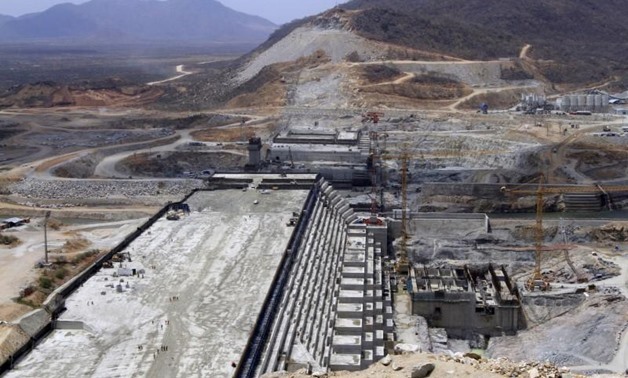
A general view of Ethiopia's Grand Renaissance Dam is seen during a media tour along the river Nile in Benishangul Gumuz Region, Guba Woreda, in Ethiopia March 31, 2015 - AFP.
CAIRO – 28 August 2018: In April 2018, Ethiopia witnessed a major ministerial reshuffle, putting Abiy Ahmed on top of the government as a successor to Hailemariam Desalegn.
At the same time, METEC, Ethiopia’s largest military- run industrial complex responsible for the production of military equipment and civilian products, also witnessed a sudden shake with the resignation of its founding CEO, Kinfe Dagnew.
Additionally, Director General of Information Network Security Agency (INSA) Teklebrhan Wolearegay submitted his resignation days after Ahmed’s official appointment.
According to Awramba Times, METEC was established in 2010 and works with several foreign companies such as Alstom from France, and Spire Corporation from the United States.
INSA was established to provide technical assistance to government agencies, ensuring the transformation of the nation’s high-tech and security industry.
Later in June Ahmed announced further changes in the corporation, including appointing the industry minister as chairman, and former premier Meles Zenawi’s widow to the seven-member board.
Company spokesperson Michael Desta commented on the decisions saying that Ahmed vowed to curb what he called “favouritism” in business toward the security forces.
METEC is not just one of the largest military-run industrial complex corporations; it’s
also responsible for running a number of mega national projects for the country, including the Grand Ethiopian Renaissance Dam.
What we know about METEC
According to Ethiopian media outlets, METEC is currently under the spotlight for 10 delayed projects for the Ethiopian Sugar Corporation. METEC started operations with a registered capital of 10 billion Br in 2010, and has incorporated 15 military and civilian companies. However, the corporation hired over 19,500 people employed by close to 98 subsidiaries.
METEC was harshly criticized by Parliament members according to The Ethiopian Satellite Television and Radio (ESAT) website. It was stated last June that METEC squandered hundreds of millions of dollars by producing machinery without a thorough study of the market.
Sources told ESAT that METEC also wasted hundreds of millions of dollars by producing defective and below standard machinery to the Ethiopian Electric Corporation. The sources also said METEC did not return $235.6 million paid for the supply of smart meters to the Electric Corporation which found that the meters had defects and demanded refund.
GERD is no different
Ethiopian PM Ahmed blamed on August 25 METEC for the delay in the construction of the multi-billion dollar Grand Ethiopian Renaissance Dam (GERD), according to The Reporter.
Abiy’s comments came during his meeting with members of the local and international press in his office, the first since he took office in April, where he noted that he visited the GERD two months ago to follow up the construction process, expressing his disappointment at METEC's performance that is lagging the project far behind.
“Salini is completing its part of the project on time and now it is demanding huge payment because the project is lagging from the side of METEC,” Ahmed told the media. “We handed over a complicated water dam project to people who have not seen a dam in their life and if we continue in that direction, the project may never see the light of day,” he added, according to The Reporter.
Later on August 26, an Egyptian high-profile official delegation was announced to head to Addis Ababa on Monday to resume the ongoing talks about the GERD. Egyptian Chief of Intelligence Abbas Kamel and Foreign Minister Sameh Shoukry were announced to travel to Ethiopia to send a verbal message from President Abdel Fatah al-Sisi to Ahmed, said spokesperson of Foreign Ministry Ahmed Abu Zeid in a statement on Sunday.
“The visit aims to follow up the Egyptian-Ethiopian relations, the means of their enhancement, and the updates of the Renaissance Dam negotiations in light of the efforts exerted to implement the 2015 Declaration of Principles and the outcome of the last meeting held in Addis Ababa in May 2018,” the statement read.
The meeting was announced to tackle the establishment of a joint developmental fund for infrastructure between the two countries and Sudan, the statement added.
Ethiopia ousts METEC from GERD
On Monday, Ethiopia announced ousting the military-run METEC from the $4 billion dam project on the River Nile due to numerous delays in completing the project, according to Reuters.
Ahmed announced that the government had cancelled the contract of METEC and would award it to another company. Italian firm Salini Impregilo remains the main contractor, while METEC was the contractor for the electromechanical and hydraulic steel structure divisions of the project, according to Reuters.
Ethiopia started building the GERD in May 2011, immediately after the Egyptian January 25 Revolution. Cairo expressed its concerns that the dam might affect its share of 55.5 billion cubic meters of Nile water. Negotiations among the three countries; Egypt Sudan and Ethiopia, were suspended for three years. However, talks resumed in 2014 and a Declaration of the Renaissance Dam Principles Charter tackling the management of the dam with written guarantees was signed. According to the charter, the dam’s reservoir cannot be filled without the approval of both Egypt and Sudan.
The current debate between Egypt and Ethiopia on GERD is a technical one, according to Mamdouh Mohamed Hassan, the head of the Central Department for Technical Cooperation at the Nile Sector of the Ministry of Water Resources and Irrigation.
Egypt demanded that Ethiopia fills the dam’s reservoir in 5- 6 years and asked Ethiopia to abide by the Nile water quantity flow in filling the reservoir to “avoid any significant damage on the downstream countries.”
Additional reporting by Samar Samir, Reuters


Comments
Leave a Comment